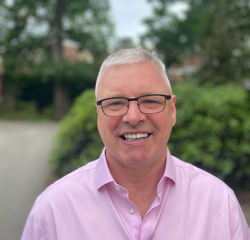
Mr David Cusack, Clinical Cardiac Investigations Service Manager for NHS Lothian and Regional Representative for the British Society of Echocardiography (BSE) shares information on the journey into healthcare science for Healthcare Science Week 2023.
Under the umbrella of healthcare science sits cardiac physiology - a diverse and continually evolving field. A career as a cardiac physiologist brings challenges, extensive training opportunities and immense satisfaction. As the service manager of Clinical Cardiac Investigations within NHS Lothian, a role I have held for the past three years, I am keen to share the pathways and career opportunities available within this area.
Currently in Scotland, the main route to becoming a qualified cardiac physiologist involves completion of a four-year NHS-funded BSc (Hons) degree in Clinical Physiology while simultaneously being employed by the NHS as a trainee cardiac physiologist. This degree is offered through Glasgow Caledonian University with the syllabus covering a diverse range of topics including general human physiology, pathophysiology and treatment approaches to disease. The training within the hospital setting equips the trainee with an ability to perform a dynamic array of clinical tests and investigations. This initially includes ECG acquisition and analysis; ECG-Holter monitor fitting and analysis; along with ambulatory BP monitoring and analysis. The trainee will then move on to develop their skills in exercise tolerance testing as well as training within the cardiac catheter laboratories. In the final training year there is an introduction to echocardiography and cardiac devices. A typical week for the trainee involves three days onsite at the hospital completing clinical work and two days at university. During my time as service manager, a total of four students have successfully completed their training, with a further eight students currently in the process. Feedback from these students is consistently positive, with students expressing how effective they find learning the theory and then being able to apply this knowledge immediately with their clinical training.
Completion of training isn’t the end, however. In my eyes, this is only the beginning of the career opportunities available. If cardiac rhythm management (CRM) takes your fancy, various NHS-funded post-graduate courses are available to allow national and international recognition of clinical excellence. This fast-paced speciality equips individuals with expertise in all aspects of cardiac device implantation and follow-up, alongside scope to undergo further speciality training within electrophysiology studies and ablation. Within the last three years, a total of eight cardiac physiologists within NHS Lothian have successfully completed/are in the process of attaining their CRM qualifications. Alternatively, if echocardiography piques your interest, working towards transthoracic BSE accreditation is possible. This offers a highly rewarding career, equipping individuals with the ability to obtain cardiac ultrasound images and aid in the diagnosis of numerous cardiac conditions. Further speciality training in congenital echocardiography and paediatric echocardiography is also an option. Over the last three years within NHS Lothian, a huge volume of echocardiography training has been undertaken, with seven cardiac physiologists and five cardiology registrars successfully achieving BSE accreditation, and a further two in the process of doing so. Alongside this vast scope for clinical training opportunities, possibilities within the field of research are also available. From masters to PHDs to clinical scientist recognition, the opportunities are endless.